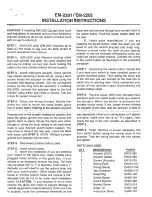
Cadillac XT4 Owner Manual (GMNA-Localizing-Europe-16412942) - 2023 -
CRC - 5/25/22
236
Driving and Operating
Biodiesel Blends
Fuels with a biodiesel content up to 7% by
volume may be used (e.g., named B7). Only
use biodiesel blends up to 7% by volume
that comply with your country's or region's
fuel standards.
Caution
Do not use blends containing more than
7% by volume biodiesel. Any engine, fuel
system, or exhaust after-treatment
system damage would not be covered by
the vehicle warranty.
As a renewable fuel, biodiesel provides some
environmental benefits. However, biodiesel
has unique properties and needs to be
handled differently than diesel fuel. Its use
presents additional risks and may not be
appropriate in all situations. Certain vehicle
operating modes increase these risks and
should be avoided.
Biodiesel fuel quality degrades with time
and exposure to high temperature more
quickly than Ultra Low Sulphur Diesel fuel.
More frequent refuelling provides the best
opportunity to have a supply of fresh fuel.
Storage at hot ambient temperatures will
accelerate biodiesel degradation.
Owners who use little fuel, or who have
vehicles stored for extended periods of time,
should avoid the use of biodiesel blended
fuels above 5% by volume. When vehicles
are stored for longer than one month, they
should be run out of biodiesel to below
one quarter tank, refuelled with
biodiesel-free diesel fuel, and driven several
kilometres (miles) before storage.
Cold Weather Operation (Diesel)
At temperatures below 0 °C (32 °F), avoid
using biodiesel blends above 5% by volume.
Using such a fuel may cause fuel filter
plugging, system gelling, and freezing, which
may adversely affect vehicle starting.
Severe winter grade diesel fuel, such as 1-D
diesel fuel or Arctic grade diesel fuel, can be
used in extreme cold temperatures (below
-18 °C or 0 °F); however, doing so will
reduce power and fuel economy. Avoid
using severe winter grade fuel in warm or
hot climates. It may result in stalling, poor
starting, and damage to the fuel injection
system.
Fuels improperly blended for cold
temperature operation may result in
restricted fuel filters. The vehicle is equipped
with a fuel heating system to prevent
gelling or waxing of conventional diesel fuel
and biodiesel blends, but it may not prevent
all cases.
In severe winter conditions, the fuel filter
may become clogged by wax naturally
present in the fuel. To unclog it, move the
vehicle to a warm garage area and allow the
filter to warm up. The fuel filter may need
to be replaced. See
Water in Fuel (Diesel)
Improper fuel tank inspection or cleaning,
or contaminated fuel from suppliers, may
cause water to be pumped into the fuel
tank along with the diesel fuel. If a WATER
IN FUEL message displays in the DIC, the
water must be drained immediately.
{
Warning
Diesel fuel containing water is still
combustible. You or others could be
burned. If the fuel needs to be drained,
keep sparks, flames, and smoking
materials away from the mixture.
















































